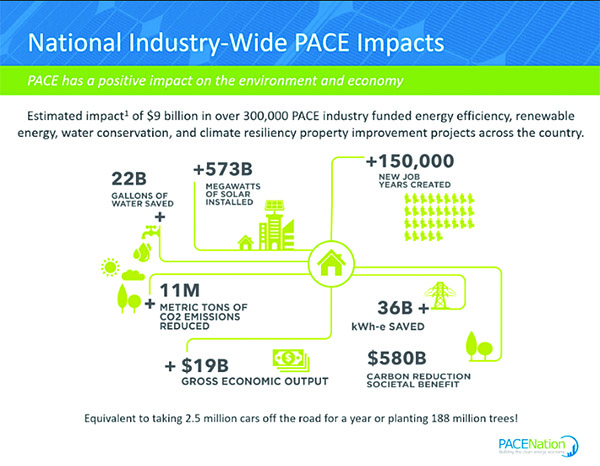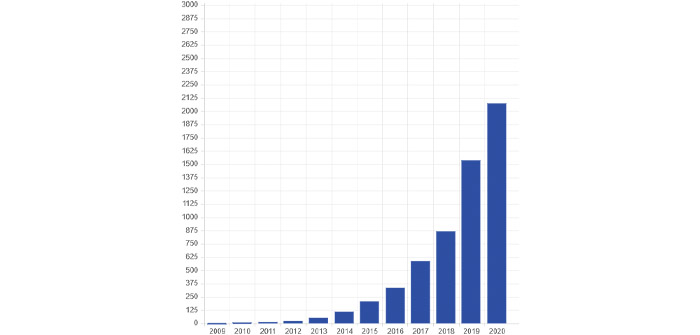(Demand for C-PACE financing is skyrocketing as commercial property owners look for ways to improve cash flow. Source: PACENation.org | Graphic courtesy of 350Deschutes)
Nationwide, commercial property owners and developers are asking for Commercial Property Assessed Clean Energy (C-PACE). C-PACE has been used in over 2,560 commercial projects to finance water conservation, energy efficiency, renewable energy, battery storage, EV charging availability, seismic stability and other resiliency features. Demand is skyrocketing as property owners learn how C-PACE overcomes barriers to investments in building performance and resiliency.
CUMULATIVE C-PACE INVESTMENT, MM (2009-2020)

(Demand for C-PACE financing is skyrocketing as commercial property owners look for ways to improve cash flow. Source: PACENation.org | Graphic courtesy of 350Deschutes)
C-PACE is enabled in the state of Oregon, but has to be authorized by a local government in order for commercial property owners to take advantage of it. Once authorized, C-PACE provides access to long-term, low-cost financing for energy efficiency, water conservation, renewable energy and resiliency projects. Multnomah County has authorized C-PACE, and Deschutes County Commissioners are currently considering whether to make C-PACE available.
More than 40 business and industry stakeholders have endorsed C-PACE authorization, including: Central Oregon Association of Realtors, Bend Chamber of Commerce, La Pine Chamber of Commerce, Brightwood Corp., First Interstate Bank, Pinnacle Architecture, Brooks Resources, Neil Kelly, St. Francis Catholic Church, Deschutes Brewery, Sunriver Brewing, Pioneer Ranch, Sungrounded Farm, LEDG Capital and AMERESCO. The effort is being spearheaded by 350Deschutes, a local nonprofit that advocates for a just transition to a clean energy economy.
“C-PACE is an efficient solution to fill gap financing, literally having the potential to flip a prospective project from a ‘no’ to a ‘yes,’” according to Todd Gray of Mereté Hotel Management and Sycan B. Corp. Mereté and Sycan are strong proponents for C-PACE; they own Element and Holiday Inn Express in Bend among many other hotels in the state. The companies are exploring how the availability of C-PACE financing could revitalize a local project that was delayed due to the pandemic.
Gray hopes the County will make C-PACE available soon to provide businesses with more economic recovery and sustainable financing options. “Bringing a new sustainable hotel to the area creates jobs and also increases the tax base while minimizing impacts to resources and infrastructure. Our business will benefit by offering our customers a healthier, more desirable eco-friendly experience while reducing our operating costs.”

(Cumulative Economic and Environmental Benefits continue to increase as more counties authorize C-PACE. Source: PACENation.org | Graphics courtesy of 350Deschutes)
C-PACE has proven to be an invaluable tool for new construction and renovations. Peter Baer of Pinnacle Architecture also hopes C-PACE will soon be an option for his clients. “CPACE is a win-win-win in our book. The business reduces operating costs, the building is healthier for occupants and environmental impacts are reduced through private market investments.”
“Healthcare, nonprofit and senior living clients are focused on COVID response, and we are looking for ways to help. In addition to financing energy efficiency, C-PACE can be used for resiliency and health measures such as touchless fixtures, HVAC and indoor air quality improvements, HEPA filtration, bi-polar ionization and UV light purification,” Baer added.
Neil Kelly recently used C-PACE to fund a major renovation on their Portland headquarters. They installed a 30-kilowatt solar array, performed significant seismic work, updated lighting and other efficiency measures and installed six EV chargers,” noted Tom Kelly, company president. “The project solved existing structural issues and significantly reduced energy and water demand. C-PACE was the right package for the project. We hope to be able to put solar on our Bend office, and C-PACE availability drastically increases the likelihood of us moving forward.”

(C-PACE financing has been used successfully in almost all commercial sectors: hospitality, commercial, industrial, office, retail, healthcare, nonprofits, churches, agriculture and multifamily (5 units or more). Source: Property Fit Multnomah County, Oregon)
Local proponents are particularly excited about successful C-PACE projects in affordable multi-family housing, homeless shelters, nonprofits and in the agricultural industry.
C-PACE can be used to fund 100 percent of the hard and soft costs for clean energy improvements on commercial properties. Financing and servicing for C-PACE typically comes from the private market and is secured by a voluntary Benefit Assessment Lien. The lien has a longer pay-back period that correlates with the energy savings. C-PACE allows for landlords and tenants to share the benefits. Investors and developers like C-PACE because the lien stays with the property and transfers to the new owner when a property is sold.
The special assessment process has been used by property owners for over a hundred years to finance improvements that have a public benefit like fire, sewer, lighting and mosquito abatement districts. In 2008, the federal government added utility savings to the special assessment process which created PACE options.
Deschutes County Commissioners are exploring options for implementing C-PACE. The County has been researching other C-PACE programs. From their research, the County was most impressed with the programs in Clark County, Washington; Milwaukee, Wisconsin and Omaha, Nebraska. 350Deschutes is encouraging the County to implement a program similar to Clark County.
Clark County adopted their C-PACE program in late October. They created an efficient, streamlined program based on industry best practices. In just three months, seven applications are in progress. Thus far, Clark County has not needed to hire additional staff; however, they anticipate program demand to increase and the potential to hire a part-time person. Clark County charges a one percent application fee with a cap of $15,000. Similar to other successful programs, Clark County expects that application fees will more than cover costs of the program and demand will increase.
Deschutes County Commissioners could decide to adopt a program similar to Clark County, or wait for a statewide C-PACE program which is likely to take years. It took New Jersey seven years to adopt a statewide program. Additionally, Deschutes County stakeholders would lose the opportunity to design a program based on what’s best for our community. Commissioners should not make local businesses wait for an economic opportunity that is readily available, paid for by user fees and funded by private lenders.
Tom Kelly advised, “In the height of an economic and environmental crisis, Deschutes County Commissioners should not miss this opportunity to create private market solutions for private property investments in cost-saving sustainable and resiliency measures. Deschutes County can make this program available now based on local rule with local stakeholder input.”
There is still time to show support for C-PACE at bit.ly/3dv0tXg.
350Deschutes engages in climate education, outreach and policy to accelerate a just transition to a clean low carbon economy, with special consideration for the needs of the most vulnerable communities.




